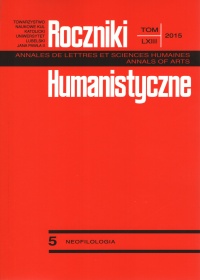Narrative as Expiative Fantasy in Ian McEwan’s Atonement
Abstract
The paper endeavours to analyse Ian McEwan’s self-reflexive novel with the theoretical apparatus provided by the psychoanalytic theory of Jacques Lacan. McEwan designs his novel as a fictitious narrative written by Briony Tallis, an aging novelist who wishes to atone for the childhood blunder that ruined the lives of her sister, Cecilia, and her sister’s beloved, Robbie. In order to gain reader’s sympathy, Briony describes her thirteen-year-old self as an idealistic and innocent child, deprived of paternal guidance, governed by the unconscious structures of the Symbolic Order. The girl’s compulsive craving for order and for control of the reality around her is linked to her narcissistic constitution, which, as Freud suggests, proves an important quality in the creative writing process. The paper follows Briony’s efforts to devise an elaborate expiative fantasy which allows her not only to create the appropriate mise-en-scène of personal atonement, but also to establish the coordinates of her desire to achieve some purpose through her writing.
References
Albers, Stefanie, and Torsten Caeners. “The Poetics and Aesthetics of Ian McEwan’s Atonement.” English Studies 90, 6 (2009): 707–720.
Bentley, Nick. Contemporary British Fiction. Edinburgh: Edinburgh University Press, 2010.
Bradley, Arthur. “The New Atheist Novel: Literature, Religion, and Terror in Amis and McEwan.” The Yearbook of English Studies 39, 1/2 (2009): 20–38.
Freud, Sigmund. “Creative Writers and Day-Dreaming.” In The Standard Edition of the Complete Works by Sigmund Freud. 24 volumes. Translated by James Strachey. Vol. IX, 143–153. London: Vintage, 2001.
Freud, Sigmund. “Instincts and Their Vicissitudes.” In The Standard Edition of the Complete Works by Sigmund Freud. 24 volumes. Translated by James Strachey. Vol. XIV, 111–140. London: Vintage, 2001.
Freud, Sigmund. “Introductory Lectures on Psycho-Analysis.” In The Standard Edition of the Complete Works by Sigmund Freud. 24 volumes. Translated by James Strachey. Vol. XV–XVI. London: Vintage, 2001.
Freud, Sigmund. “The Ego and the Id.” In The Standard Edition of the Complete Works by Sigmund Freud. 24 volumes. Translated by James Strachey. Vol. XIX, 3–66. London: Vintage, 2001.
Freud, Sigmund. “Totem and Taboo.” In The Standard Edition of the Complete Works by Sigmund Freud. 24 volumes. Translated by James Strachey. Vol. XIII, 1–161. London: Vintage, 2001.
Grigg, Russell. Lacan, Language and Philosophy. Albany: State University of New York Press, 2008.
Head, Dominic. Ian McEwan (Contemporary British Novelists). Manchester: Manchester University Press, 2007.
Lacan, Jacques. Écrits. Translated by Bruce Fink. New York: W.W. Norton & Company, 2006.
Lacan, Jacques. The Four Fundamental Concepts of Psycho-Analysis [The Seminar of Jacques Lacan Book XI]. Edited by Jacques-Alain Miller. Translated by Alan Sheridan. New York: W.W. Norton & Company, 1981.
Lacan, Jacques. The Seminar of Jacques Lacan Book I. Freud’s Papers on Technique, 1953-1954. Edited by Jacques-Alain Miller. Translated by John Forrester. New York: W.W. Norton & Company, 1991.
Letissier, Georges. “‘The Eternal Loop of Self-Torture’: Ethics and Trauma in Ian McEwan’s Atonement.” DQR Studies in Literature 48 (2011): 209–226.
McEwan, Ian. Atonement. London: Vintage, 2002.
Schemberg, Claudia. Achieving ‘At-one-ment.’ Storytelling and the Concept of the Self in Ian McEwan’s The Child in Time, Black Dogs, Enduring Love and Atonement. Frankfurt am Main: Peter Lang, 2004.
Wells, Lynn. Ian McEwan (New British Fictions). Houndmills: Palgrave Macmillan, 2010.
Žižek, Slavoj. How to Read Lacan. London: Granta Books, 2006.
Žižek, Slavoj. Looking Awry. An Introduction to Jacques Lacan through Popular Culture. Cambridge, Ms: The MIT Press, 1992.
Žižek, Slavoj. The Sublime Object of Ideology. London: Verso, 2008.
Copyright (c) 2015 Roczniki Humanistyczne

This work is licensed under a Creative Commons Attribution-NonCommercial-NoDerivatives 4.0 International License.





